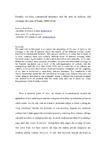Mostrar o rexistro simple do ítem
Friendly societies, commercial insurance and the state in sickness risk coverage: the case of Spain (1880-1944)
| dc.contributor.author | Pons Pons, Jerònia | |
| dc.contributor.author | Vilar Rodríguez, Margarita | |
| dc.date.accessioned | 2020-06-09T12:43:53Z | |
| dc.date.available | 2020-06-09T12:43:53Z | |
| dc.date.issued | 2011-04 | |
| dc.identifier.citation | Pons, J. P., & Rodríguez, M. V. (2011). Friendly Societies, Commercial Insurance, and the State in Sickness Risk Coverage: The Case of Spain (1880–1944). International Review of Social History, 56(1), 71-101. https://doi.org/10.1017/S0020859010000714 | es_ES |
| dc.identifier.issn | 0020-8590 | |
| dc.identifier.uri | http://hdl.handle.net/2183/25692 | |
| dc.description.abstract | [Abstract:]The main aim of this paper is to analyse the singularity of the Spanish position with regard to coverage of the risk of sickness within the context of the different welfare models described in international literature. This analysis enables us to verify that in Spain, as in other countries, there were initially different forms of sickness coverage which coexisted, created by the market, by workers themselves and, gradually, by the state. Within this so-called mixed economy of welfare, the most extensive health coverage for the Spanish population was a result of the self-organization of workers, and this continued until the Civil War (1936–1939), not so much due to its efficacy and viability, as to the slow development of private insurance companies and the inability of the state to implement compulsory sickness insurance. The installation of the Franco dictatorship meant that the introduction of compulsory sickness insurance was further delayed, and when it was eventually passed, it offered only limited coverage, was enacted more for political than for social ends, and was to result in the virtual disappearance of friendly societies.[Resumen:]El principal propósito de este texto es analizar la singularidad española en relación a la cobertura del seguro por enfermedad en el contexto de diferentes modelos de bienestar descritos por la literatura internacional. Este análisis nos permite verificar que en España, como en otros países, inicialmente coexistieron formas distintas de cubrir la enfermedad, creadas por el mercado, por los propios trabajadores y, gradualmente, por el Estado. En estas denominadas economías mixtas de bienestar, la cobertura de salud más extensa entre la población española fue resultado de la propia organización de los trabajadores, manteniéndose hasta la Guerra Civil (1936–1939), no tanto por su eficacia y viabilidad, como por el lento desarrollo de las compañías de seguros privados y la incapacidad del Estado para instaurar seguros de enfermedad obligatorios. La instauración de la dictadura de Franco significó que esta cuestión se retrasará una vez más y, cuando se aprobó, ofrecía tan sólo una cobertura limitada. Su promulgación se debía más a fines políticos que sociales y provocó la desaparición virtual de las sociedades de ayuda mutua. | es_ES |
| dc.language.iso | eng | es_ES |
| dc.publisher | Cambridge University Press | es_ES |
| dc.relation.uri | https://www.cambridge.org/core/journals/international-review-of-social-history/article/friendly-societies-commercial-insurance-and-the-state-in-sickness-risk-coverage-the-case-of-spain-18801944/BD2CC4519DC4B691DB565C93A377ED25 | es_ES |
| dc.rights | Atribución-NoComercial-SinDerivadas 4.0 España | es_ES |
| dc.rights.uri | http://creativecommons.org/licenses/by-nc-nd/4.0/es/ | * |
| dc.subject | Commercial Insurance | es_ES |
| dc.subject | Sickness Risk Coverage | es_ES |
| dc.subject | Spain | es_ES |
| dc.subject | Seguros de enfermedad | es_ES |
| dc.subject | Sociedades de ayuda mútua | es_ES |
| dc.subject | Seguros comerciales | es_ES |
| dc.title | Friendly societies, commercial insurance and the state in sickness risk coverage: the case of Spain (1880-1944) | es_ES |
| dc.type | journal article | es_ES |
| dc.rights.accessRights | open access | es_ES |
| UDC.journalTitle | International Review of Social History | es_ES |
| UDC.volume | 56 | es_ES |
| UDC.issue | 1 | es_ES |
| UDC.startPage | 71 | es_ES |
| UDC.endPage | 101 | es_ES |
| dc.identifier.doi | https://doi.org/10.1017/S0020859010000714 | |
| UDC.coleccion | Investigación | es_ES |
| UDC.departamento | Economía | es_ES |
| UDC.grupoInv | Grupo de Estudos de Historia da Empresa (GEHE) | es_ES |
Ficheiros no ítem
Este ítem aparece na(s) seguinte(s) colección(s)
-
Investigación (FEE) [923]






